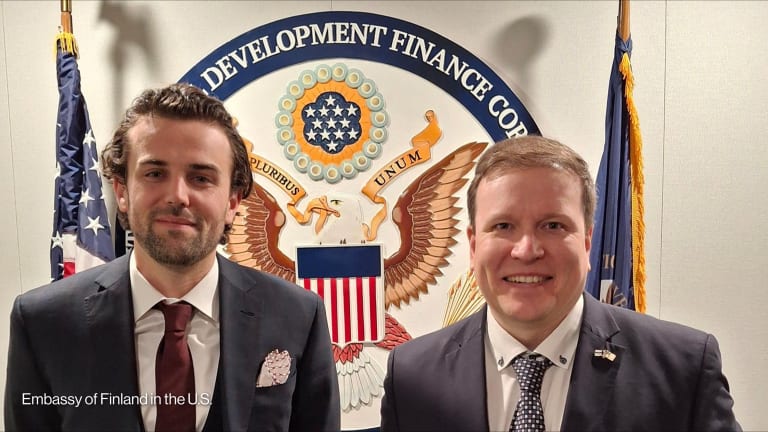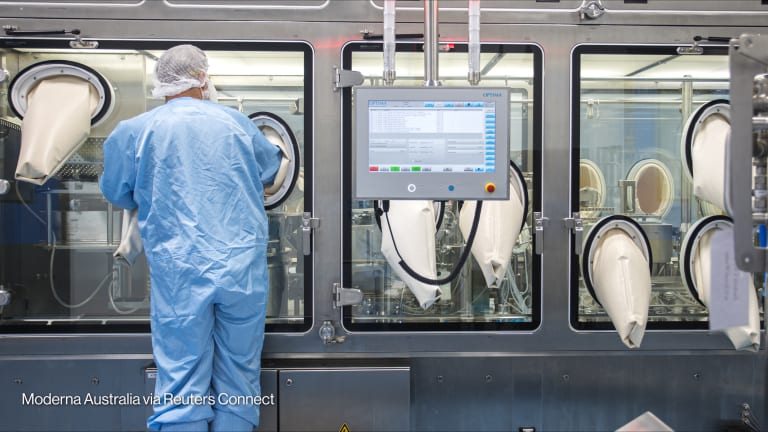
As tremendous progress is made on routine innoculations, the next challenge for vaccines may be in tackling emerging infectious diseases and antimicrobial resistance. It will require upfront investment — but the returns could be significant.
“This is an area where I think the world is wise to invest because vaccines are very inexpensive compared to the costs of caring for people that end up with the disease in a given population,” said Rajeev Venkayya, the president of the Global Vaccine Business Unit at Takeda Pharmaceuticals. “It’s far more cost effective to immunize the population to prevent the outbreaks than it is to treat the outbreaks once they happen and in fact its one of the most cost effective tools we have in public health.”
Venkayya has seen vaccines from every angle. Before launching Takeda’s global vaccine business five years ago, he served as senior director for biodefense at the White House and director of global health delivery at the Bill & Melinda Gates Foundation.
The success of vaccines going forward, he says, requires public and policy support for investments “to make sure that we're driving strong immunization coverage everywhere but also investing in new vaccines for the diseases that should be vaccine preventable,” he said.
In his current role, Venkayya is helping the company develop four vaccines: dengue, norovirus, Zika and polio. The Zika vaccine is funded by the Biomedical Advanced Research and Development Authority, or BARDA, part of the U.S. Department of Health and Human Services. The polio vaccine received funding from the Gates Foundation, which came along with price commitments for a five-year period after it is released. He is also working to help use some of the lessons learned from the Ebola outbreak to speed up the vaccine development process while assuring quality and safety.
Devex sat down with Venkayya in Geneva at a summit held last month during the World Health Assembly. Here are excerpts from that conversation, edited for length and clarity.
What do you see as the key challenges in the vaccine industry today?
Emerging infectious diseases are a big problem. If you look at the big outbreaks we've had in the world, they seem to have accelerated in the past 15 years. Maybe that's because of increased travel, maybe it's because of increased connectivity, but for whatever reason, there seem to be more and with shorter intervals between them. This is not just pandemic flu; it’s things like MERS [Middle East Respiratory Syndrome] and Zika and SARS [Severe Acute Respiratory Syndrome].
As we've seen with Ebola, it’s really hard to come up with a new vaccine to protect the population. Usually people want a vaccine more than anything else when these things come up. It really takes a long time to develop a vaccine. One of the biggest challenges is getting a pipeline in place and having a regulatory framework that allows you to quickly go from a candidate through full clinical development — from preclinical through phase three or at least into human centers and emergency authorization. CEPI [the Coalition for Epidemic Preparedness Innovations] is, I think, largely intended to help address that, although I don't know if that will be sufficient.
The other big risk is around antimicrobial resistance, and here, vaccines could be a very important tool that could really save us. In the case of AMR, the good news is we have some programs which are tackling resistant bacteria of interest. But there are a number that are uncovered, unaddressed, so we probably need more research and development there.
I think the other issue that cuts across all areas of development is regulatory science and the long expensive process necessary to demonstrate that vaccines are safe and efficacious. We need to find ways to compress that, particularly in diseases where the epidemiology makes it hard to conduct a large clinical trial to show that your product is working. The perfect example here is Ebola, where it became very difficult, if not impossible, to conduct a phase three clinical trial with the Ebola vaccine because there wasn’t any ebola happening. People don’t necessarily automatically appreciate this, but you have to have the disease if you want to be able to show that a vaccine is working.
Pharmaceutical companies are often accused of pricing vaccines and medicines so that they are unavailable to the poorest who may need them. How do you approach pricing?
Vaccine programs, like any program in a pharma company, in order to be sustainable, they have to recoup the investment we've made in R&D and ideally support more R&D for improvements to the vaccine or development of new vaccines. A critical consideration for most companies when they take on a program is to make sure that there is a return on the investment, and that return on the investment is important to ensure that whatever you're doing is sustainable. If you're not getting a return on your investment, this is going to be a program that's going to be hard to defend inside a company, where decisions are made about resource allocation.
The only way that investment is going to happen is if we have a sustainable framework to support R&D and commercialization of vaccines, which means that we're going to have to maintain a pricing framework that allows innovation to be rewarded. If we undercut that pricing schema, then it will become increasingly difficult for companies to justify investments into new vaccines, which puts us at a tremendous disadvantage as we face greater emerging infectious disease threats, antimicrobial resistance and other threats that require vaccines.
One of the key principles we have is around access and equity, and that comes from the DNA of the organization. For us, it’s very important to first and foremost have the maximum impact one can have, and that means getting the vaccine to everyone who needs it or wants it. In order to do that one thing, you need to make sure you have a rational, fair and defensible pricing policy. We're thinking a lot about that with all of these vaccines.
With Gates, we've committed to a price, which we haven’t disclosed, but we're locked in there. In the case of the Zika vaccine, we will price that in a responsible way because that’s the way we want to operate as a company but also because this program is being funded by the U.S. taxpayers. The R&D expense is being offloaded from us, and I think we feel an additional sense of responsibility to be very thoughtful about pricing.
You’ve had quite a varied career, including the government, philanthropic and private sectors, as well as practicing medicine. What drove you to take this path and what have you learned about how different sectors can work together?
My desire to be in government and the Gates Foundation and now a company is to have an impact. I think a lot of people are driven by that principle, and you can find many ways to have an impact. I was initially drawn to policy because I felt that particularly the U.S. government can do a lot of good if it has smart policies in a number of areas. I also felt that somebody who had sense for what it takes to strengthen the medical and public health system could address the bioterrorism/biodefense challenge in a way that actually strengthened our core capabilities in public health as a means for getting to better biopreparedness, as opposed to coming up with biodefense specific things that are not sustainable.
The Gates Foundation is all about maximizing impact. It was for me a natural transition, because I'd been working on vaccines to some degree in the U.S. government and vaccines were the top priority for the foundation. Coming to a company, it’s again about impact but from a perspective where you're much closer to the creation of technologies that are going to have the impact. Every day we're doing clinical studies or laboratory-based studies to develop a new tool that we can put in the hands of public health professionals and medical practitioners. That’s very exciting, to create something brand new to address a really challenging disease. So for me these are different angles, different ways of addressing the same types of public health problems. I like the experience of playing different roles in that enterprise.
I do feel a sense of responsibility to bridge the divides where they exist between the NGO sector and the industry, government and industry. I also feel that I have the latitude to speak freely about certain things, because I've been in different worlds and that gives me perhaps a little more liberty than others might feel. I just say what I think about how any actor is behaving and I don’t really worry too much about somebody criticizing me, because I can actually defend what I'm saying from my own experience.
Editor’s note: The reporter traveled to Geneva with the support of Takeda. Devex retains full editorial independence and responsibility for this content.
Read more international development news online, and subscribe to The Development Newswire to receive the latest from the world’s leading donors and decision-makers — emailed to you free every business day.








